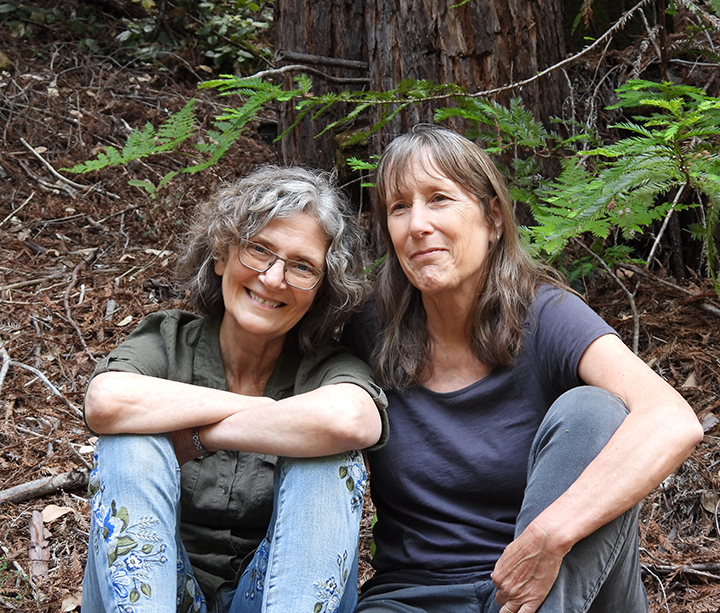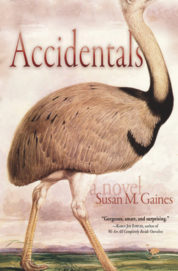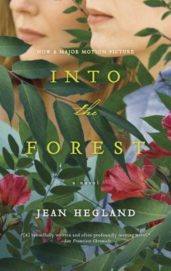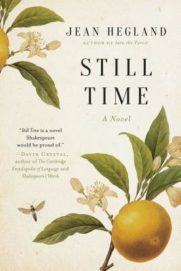 Novelists Susan M. Gaines and Jean Hegland have been exchanging and discussing drafts of their books for nearly thirty years. Earlier this year, they found themselves sheltering in place together in Jean and her husband’s northern California home. At the beginning of March, Susan traveled from Germany, where she has been living and working for many years, to the AWP Conference in San Antonio, the first stop in a book tour for her new novel, Accidentals (Torrey House Press, $18.95). A week later, she was at Jean’s house preparing for the rest of the tour, but in rapid order her book tour was canceled, Germany closed its borders, and California issued “stay at home” orders. In the conversation below, conducted over ten weeks of quarantine, Susan and Jean reflect on their communal writing life in the midst of pandemic.
Novelists Susan M. Gaines and Jean Hegland have been exchanging and discussing drafts of their books for nearly thirty years. Earlier this year, they found themselves sheltering in place together in Jean and her husband’s northern California home. At the beginning of March, Susan traveled from Germany, where she has been living and working for many years, to the AWP Conference in San Antonio, the first stop in a book tour for her new novel, Accidentals (Torrey House Press, $18.95). A week later, she was at Jean’s house preparing for the rest of the tour, but in rapid order her book tour was canceled, Germany closed its borders, and California issued “stay at home” orders. In the conversation below, conducted over ten weeks of quarantine, Susan and Jean reflect on their communal writing life in the midst of pandemic.
Susan M. Gaines is the author of the novels Accidentals and Carbon Dreams (Creative Arts, 2000) as well as the science narrative Echoes of Life (Oxford University Press, 2008). Her stories have appeared in the North American Review, Missouri Review, Best of the West, and other anthologies, and been nominated twice for the Pushcart Prize. She is founding director of the Fiction Meets Science Program at the University of Bremen in Germany.
Jean Hegland’s first novel, Into the Forest (Calyx, 1996), has been translated into seventeen languages and adapted as a Canadian film (starring Ellen Page and Evan Rachel Wood) and a French graphic novel. She is also the author of Windfalls (Atria, 2004), which tells the parallel stories of two mothers, and Still Time (Arcade, 2015), about an aging Shakespeare scholar’s final encounters with the plays.
The rains have ended. Despite all the news of death and mayhem, they feel the pull of spring in the forest—the buoyant air, the mating birds and wildflowers, the lengthening days. . . . They go for afternoon runs or walks—Jean scanning the ground for scat and tracks, Susan scanning the canopy for birds. The days are punctuated by the household’s ritualistic inquiries: Did you sleep? Did you get time with the book? Whatcha working on? What should we make for dinner? Is it late enough to open the wine? Do we want to watch a movie tonight? They write or try to write. They watch the movie Honeyland, but it’s too sad. They try Picard, but it’s too violent. They order lots of books. Susan makes a trip to Safeway for supplies, which they decontaminate on the deck. They’re some three weeks into their quarantine, but already losing track of time.
Jean Hegland: I’ve long dreamed of the two of us sharing a months-long writer’s retreat—or at least not living so far apart. Now, of course, as wonderful as it is to have you installed in our back bedroom, I keep thinking about how awful it must feel for you to be stuck in our forest right now, so far from your own home, watching the pile-up of deaths and collapse of the world economy and ever-more-idiotic and dangerous pronouncements from the White House, instead of traveling around talking about the magnificent novel you poured your soul and intellect into for so many years.
Susan M. Gaines: It’s not awful here. It’s beautiful. I’m stuck in a place, if not a house, that is as much home to me as any. We’re in the woods, and the sun is shining. I can run for miles without seeing another human. Every time we have this conversation, I can only think about how privileged we are out here, basically doing what we always do, still healthy, finances not unaffected, but more than sufficient. What I feel is guilty. Every feeling of disappointment comes with a disclaimer attached.
 JH: Accidentals is such a rich, intelligent mix of science and natural history, politics and family history, and fabulous storytelling. I’m heartbroken that it was released at such a bad time, just as everything shut down.
JH: Accidentals is such a rich, intelligent mix of science and natural history, politics and family history, and fabulous storytelling. I’m heartbroken that it was released at such a bad time, just as everything shut down.
SMG: It’s a bad time to release any book. But I actually think it’s precisely the right time for Accidentals to be out in the world, just as people find themselves turning to both science and the natural world for comfort and meaning. It’s a story that reminds us of how the past shadows the present and shapes the future—of how easily and how often the existential problems of mass extinction and climate change have been eclipsed by seemingly more immediate, concrete threats such as the Cold War, terrorism, financial crisis . . . and, now, a deadly pandemic.
This is what’s so frustrating to me—it’s the perfect time for Accidentals to be released, but with bookstores closed and everyone’s attention riveted on pandemic news, I wonder how readers will ever find it.
 JH: That’s the same problem the new Spanish edition of Into the Forest is facing. It was released just days before all of Spain was quarantined, and while the press, Errata Naturae, has done a heroic job of trying to bring En el Corazon del Bosque to the attention of readers, I suspect its readership will also be much diminished due to this infinitely larger tragedy.
JH: That’s the same problem the new Spanish edition of Into the Forest is facing. It was released just days before all of Spain was quarantined, and while the press, Errata Naturae, has done a heroic job of trying to bring En el Corazon del Bosque to the attention of readers, I suspect its readership will also be much diminished due to this infinitely larger tragedy.
SMG: The pandemic is affecting the literary world in so many different ways. Torrey House Press, for example, is a nonprofit environmental and literary press with a small salaried staff of publishing professionals, and I hate to think what the financial failure of Accidentals and their other spring and summer releases might mean for their future.
Four weeks into their quarantine. Susan sprains her little toe and can’t run. They spend whole days on the phone and Zoom with relatives and friends. Jean applies her rusty sewing skills to making masks. Susan accidentally kills a little brown wood rat that the cat brought in. Jean braves a trip to Costco. They see a tiny coral colored snake they’ve never seen before. Jean and Douglas clear dead trees along the road, preparing for fire season. On the second Yahrzeit of Susan’s husband Stephan’s death, they huddle in the alcove near the router to attend a Zoom Baz Mitzvah for Jean and Douglas’s twin granddaughters, from their living room in Chico. They sob and laugh. It feels strangely hopeful.
JH: While it’s one thing to consider what this pandemic means for the books we’ve already written, it’s yet another to consider its impact on the books we’re currently writing.
SMG: For me, it’s hard to separate the impact of the pandemic from all the other circumstances of work on this new, half-conceived novel. The thing about working on a book for as long as I worked on Accidentals is that you forget how to start something new, how to face the blank page, how to hear a new voice. And in this case, the whole process was aggravated—blocked really—by Stephan’s sudden death, and my endless, debilitating grief. But I thought I had at least settled the major issues and characters for this story, and I was looking forward to digging in—this book tour had some free weeks built in that I was hoping to dedicate to research and writing… And now, you’d think I’d have all the time in the world . . . But, well.
JH: In that sense, I think I have it easier than you, because my new novel is much closer to being finished than your new project is. I’d like to think that the first three-quarters of the book are in pretty darn good shape, especially thanks to the months I spent in residence at the Jan Michalski Foundation last fall. So as hard as it’s been for me to concentrate on writing of late, at least I know what I want to try to accomplish when I do manage to show up at my desk.
SMG: The other day, you came in from your writing hut with this completely jubilant smile on your face. You mumbled something about “generating new messes,” and you looked like you’d just launched yourself off a cliff and realized you could fly—you’re in the end-run, for sure. I can’t wait to read a complete draft with our writers’ group, hear what the guys think about that marvelous, quirky voice—I’ve come to think of that book’s main character as if he’s some mutual acquaintance of ours, rather than a character you invented. Maybe the four of us can actually get together, sit around the big deck table, six feet apart…
JH: I’d be utterly sunk if I were trying to begin a new project right now.
SMG: My non-existent new novel suffers from a lot of pre-existing conditions that I can’t blame on the pandemic. But I thought I was ready to leap off the cliff and fly with it, generate some nice messes. . . . And now the pandemic has me second-guessing each of my decisions about the timing and setting and even the main themes of the book. We never know the future circumstances in which a book will be read, but we assume—we have to assume—some coherence with the past. Ironically, that’s precisely the reason Accidentals seems so timely right now. It’s about the society that bred this moment, the past that shadows it. But as I face the blank page now, I have the feeling we are facing such a paradigm shift—or universal breakdown—in society, that anything I write will instantly be rendered irrelevant for future readers.
JH: Remember how in the aftermath of 9/11 it seemed impossible to write anything that didn’t somehow take it into account, even if what we were writing was set pre-9/11?
SMG: Imagine deciding to plot out a novel that features both a pandemic and a raving sociopath—the leader of the richest so-called democracy in the world—who tells citizens to drink bleach to get rid of the virus—
JH: Our writers’ group would have shot this down in the first draft.
Six weeks into their quarantine. A pair of Hutton’s vireos build a nest on the back bathroom window sill. Susan convinces them to stay on the nest while she showers. Jean’s new hive of bees is thriving. Susan is running again. Jean signs up for an online Shakespeare class. Susan attempts to go birding, but hears more than she sees. They attend a few Zoom book readings and benefits. Susan feeds the sourdough with powdered sugar from a clearly labeled jar, but redeems herself by making an admirably crusty, sour loaf of bread. The evening entertainment choices are reduced to Stephen Colbert or Mozart in the Jungle.
JH: Finally, hovering over the question of what this pandemic means for the books we’ve written and for the books we’re trying to write is the biggest question of all—the existential motherfucker that keeps all of us writers turning on the spits of our own devising—and that is the question of why we are doing any of this, whether stories and poems and essays can ever have any true or lasting impact.
Sometimes I really do think it's a worthless enterprise, that drinking bleach—or at least a nice pinot noir—might be the best response to this world-wide catastrophe, after all. But in my more sanguine moments I remind myself of what cognitive neuroscientists tell us—that Homo sapiens is indeed the “story-telling animal.” We are hardwired to see the world in terms of narrative. We depend on stories to teach us, challenge us, comfort us, entertain and distract us. I can’t imagine my own life without the solace, inspiration, and education of stories.
SMG: Of course we need stories—they determine our understanding of everything, including, I should mention, science. But how do meaningful stories get out into the world? How do they exert their power? Their dissemination and reception are so interwoven with capitalism and the market. It’s hard to separate the power of stories—and the ways they are used and abused—from economic power.
 JH: I really lament all the important and beautiful books I’ll never know about because our culture so often promotes only the simplest, most status-quo-reinforcing stories.
JH: I really lament all the important and beautiful books I’ll never know about because our culture so often promotes only the simplest, most status-quo-reinforcing stories.
SMG: In my daily writing life, I usually dance around the entire question of why I do what I do, why I devote myself to a vocation that fails to keep me fed and housed—and also has questionable social impact in the world at large. My habitual sidestep is to tell myself that writing is all I really know how to do well, so I should just focus on telling the best story I know how to tell—the most necessary story I can imagine, a story that no one else is going to tell—and after I’ve done that, I’ll worry about how to get it out in the world where it can find readers to engage with. But with the natural world and our entire civilization in such deep trouble, isn’t it just another cop-out? Perhaps I should quit writing novels altogether and do something useful, like take out the president or work at a grocery store.
JH: Both of those would be heroic occupations, but I’d still like to think that if you can just tell the story you want to tell in your next novel—and if other fine writers are also telling their best stories, and if dedicated presses, committed booksellers, and passionate readers are also doing their parts . . . then we can seed our culture’s thinking with post-pandemic narratives that are more meaningful, empathetic, and sustainable than the narratives of greed, fear, rampant nationalism, and viral capitalism that led us into this mess.
SMG: Well. At least that makes for a good story!
Ten weeks into quarantine. Susan and Jean—and husband—are still friends. Three baby vireos fledge without saying goodbye. Accidentals finds some readers, and Susan makes virtual visits to a few enthusiastic book clubs. The sourdough starter is quiet. Susan adds random thoughts to the notebook for her novel, working title Anthropocene Blues. The summer heats up, fire season looms. Their writers group of four meets—outdoors, properly distanced, hugs forbidden—to discuss a draft of Jean’s novel. Susan sees the first non-stop flights to Germany and books a return in late June.
